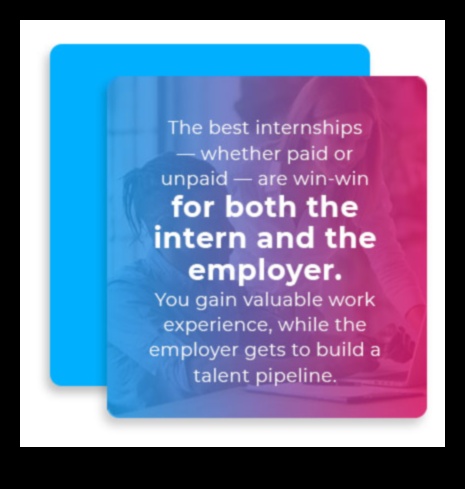 <h1>Do You Get Paid for Internships?</h1>
<h1>Do You Get Paid for Internships?</h1>
<p>Internships are a great way for students to gain experience in their field of interest, but they often don’t come with a paycheck. However, there are some paid internships available, and they can offer significant financial benefits to students.</p>
<p>In this article, we’ll discuss whether or not you get paid for internships, the benefits of paid internships, and how to find and apply for paid internships.</p>
<h2>What is a Paid Internship?</h2>
<p>A paid internship is a temporary position that provides students with the opportunity to gain experience in their field of interest while also earning a paycheck. Paid internships are typically offered by businesses and organizations that are looking for talented students to help with their projects.</p>
<h2>Benefits of Paid Internships</h2>
<p>There are many benefits to participating in a paid internship, including:</p>
<ul>
<li>Earning a paycheck</li>
<li;>Gaining valuable experience</li>
<li;>Networking with professionals</li>
<li;>Building your resume</li>
<li;>Improving your job prospects</li>
</ul>
<h2>How to Find Paid Internships</h2>
<p>There are a few different ways to find paid internships. Here are a few tips:</p>
<ul>
<li>Search online job boards</li>
<li;>Contact companies directly</li>
<li;>Network with friends and family</li>
<li;>Attend career fairs</li>
<li;>Use internship search engines</li>
</ul>
<h2>How to Apply for Paid Internships</h2>
<p>When applying for paid internships, it’s important to follow these tips:</p>
<ul>
<li>Tailor your resume and cover letter to each internship</li>
<li;>Do your research and highlight your skills</li>
<li;Practice your interview skills</li>
<li;Be prepared to negotiate your salary</li>
</ul>
<h2>Interviewing for Paid Internships</h2>
<p>When interviewing for paid internships, it’s important to be prepared to answer questions about your skills, experience, and goals. Here are a few tips for interviewing for paid internships:</p>
<ul>
<li>Dress professionally</li>
<li;Be prepared to answer questions about your resume and cover letter</li>
<li;Be enthusiastic and show your interest in the internship</li>
<li;Ask questions about the internship and the company</li>
</ul>
<h2>Negotiating a Paid Internship</h2>
<p>If you’re offered a paid internship, it’s important to negotiate your salary. Here are a few tips for negotiating a paid internship:</p>
<ul>
<li;Do your research and find out what the average salary is for paid internships in your field</li>
| Topic | Answer |
|---|---|
| Internship pay | Paid internships typically offer a stipend or hourly wage, while unpaid internships do not provide any compensation. |
| Internship salary | The average salary for an intern is \$16.56 per hour, according to Glassdoor. |
| Intern salary | Interns typically earn between \$10,000 and \$20,000 per year, depending on the industry and location. |
| Unpaid internship | Unpaid internships are legal in the United States, but there are some restrictions on how they can be structured. |
| Paid internship features | Paid internships offer a number of benefits over unpaid internships, including: |
|

II. What is a paid internship?
A paid internship is a temporary position in which a student or recent graduate works for a company or organization in exchange for a salary. Paid internships are typically offered to students who are enrolled in college or graduate school, and they can provide valuable experience in a particular field of work.
Paid internships can be a great way for students to gain real-world experience, learn new skills, and network with professionals in their field. They can also help students to get a foot in the door at a company or organization that they are interested in working for.
However, it is important to note that not all internships are paid. Some internships are unpaid, which means that the intern does not receive a salary. Unpaid internships can still be valuable, but they are typically less competitive than paid internships.
If you are interested in pursuing an internship, it is important to do your research and find out which internships are paid and which are unpaid. You should also consider the benefits and drawbacks of both paid and unpaid internships before making a decision.
III. Benefits of paid internships
Paid internships offer a number of benefits for students, including:
- Financial compensation
- Work experience
- Networking opportunities
- Professional development
- A chance to explore career options
Financial compensation can help students cover the costs of living and school, while work experience can help them develop the skills and knowledge they need to succeed in their chosen field. Networking opportunities can help students connect with potential employers and mentors, and professional development can help them improve their skills and knowledge. A chance to explore career options can help students make informed decisions about their future careers.
Overall, paid internships can be a valuable experience for students. They offer a number of benefits that can help students in their academic and professional careers.

IV. How to find paid internships
There are a number of ways to find paid internships, including:
Online job boards: Many online job boards list paid internships. Some popular job boards include Indeed, Glassdoor, and LinkedIn.
University career centers: University career centers often have lists of paid internships available to students.
Networking: Talk to your professors, classmates, and friends and family members about paid internships they know about.
Internship fairs: Attend internship fairs to meet with employers and learn about their paid internship opportunities.
Company websites: Check the websites of companies you’re interested in to see if they have any paid internship opportunities listed.
Social media: Follow companies on social media to stay up-to-date on their latest job postings, including paid internships.

V. How to apply for paid internships
There are a few different ways to apply for paid internships. You can:
- Search online job boards and internship websites for listings.
- Network with your friends, family, and professors to find out about opportunities.
- Contact companies directly to inquire about internships.
When you’re applying for paid internships, it’s important to make sure that you highlight your skills and experience that are relevant to the position. You should also tailor your resume and cover letter to each individual internship that you apply for.
Here are a few tips for writing a successful internship application:
- Do your research and make sure that you understand the company and the internship position that you’re applying for.
- Highlight your skills and experience that are relevant to the position.
- Tailor your resume and cover letter to each individual internship that you apply for.
- Proofread your application materials carefully before submitting them.
If you’re applying for a paid internship, it’s also important to be prepared to negotiate your salary. You should have a good idea of what the average salary is for the position that you’re applying for, and you should be prepared to negotiate for a salary that is fair and competitive.
Do you get paid at internships?
The answer to this question depends on the specific internship. Some internships are unpaid, while others offer a stipend or salary. The type of internship you are interested in will typically determine whether or not you will be paid.
Unpaid internships are often offered by small businesses or non-profit organizations that do not have the budget to pay interns. However, unpaid internships can still be valuable experiences, as they can provide you with the opportunity to learn new skills, gain valuable work experience, and network with professionals in your field.
Paid internships are more common at larger companies or organizations that have the budget to pay interns. Paid internships can offer you the opportunity to earn a salary while you learn new skills and gain valuable work experience.
Ultimately, the decision of whether or not to accept an unpaid internship is a personal one. You should weigh the pros and cons of unpaid internships before making a decision. Some factors to consider include:
- The type of internship you are interested in
- The size of the company or organization that is offering the internship
- Your financial situation
- Your willingness to work for free
If you are considering an unpaid internship, be sure to do your research and make sure that the internship is a good fit for you. You should also be prepared to negotiate the terms of the internship, such as the length of the internship, the hours you will work, and the benefits you will receive.
VII. Negotiating a paid internship
When you’re offered a paid internship, it’s important to negotiate your salary. This is your chance to get the best possible deal for yourself. Here are a few tips for negotiating a paid internship:
- Do your research. Find out what the average salary is for interns in your field and location. This will give you a starting point for your negotiations.
- Be confident. Don’t be afraid to ask for what you want. The worst that can happen is that they say no.
- Be prepared to walk away. If you’re not happy with the salary that’s offered, don’t be afraid to walk away. There are plenty of other paid internships out there.
Here’s a sample script that you can use when negotiating a paid internship:
- “Thank you for offering me this internship. I’m very excited about the opportunity to work with your company.
- I’ve done some research, and the average salary for interns in my field and location is \$X. I’m confident that I can contribute to your company and that I’m worth \$Y.
- Would you be willing to meet me in the middle at \$Z?”
If the company is willing to meet you in the middle, great! You’ve successfully negotiated a higher salary for yourself. If not, you can still accept the internship at the original salary or walk away.
Remember, negotiating a paid internship is your chance to get the best possible deal for yourself. Don’t be afraid to ask for what you want!

Starting a paid internship
Starting a paid internship can be an exciting and rewarding experience. However, it can also be a lot of work. In this section, we will provide you with tips on how to make the most of your paid internship.
1. Do your research. Before you start your internship, it is important to do your research and learn as much as you can about the company and the industry. This will help you to understand what is expected of you and to make the most of your time.
2. Get involved. Don’t be afraid to get involved in your internship. Ask questions, volunteer for projects, and take initiative. The more involved you are, the more you will learn and the more you will impress your supervisors.
3. Network. Your internship is a great opportunity to network with people in your field. Talk to your supervisors, colleagues, and interns. Get their advice, learn from their experiences, and build relationships that could help you in your future career.
4. Be professional. It is important to be professional at all times during your internship. This means dressing appropriately, being on time for work, and being respectful of your supervisors and colleagues.
5. Be prepared to work hard. Internships are not easy. You will be expected to work long hours and to do challenging work. However, if you are prepared to work hard, you will be rewarded with a valuable learning experience.
6. Be open to new experiences. Internships are a great opportunity to learn new things and to grow as a person. Be open to new experiences and don’t be afraid to try new things. You might just surprise yourself with what you are capable of.
7. Have fun! Internships are a great opportunity to have fun and meet new people. Enjoy your time and make the most of it!
IX. Benefits of paid internships for students
Paid internships can provide a number of benefits for students, including:
- Financial support
- Professional experience
- Networking opportunities
- Career advancement
Financial support
Paid internships can help students cover the cost of living while they are in school. This can be a significant benefit, especially for students who are not able to rely on financial support from their families.
Professional experience
Paid internships provide students with valuable professional experience that can help them to prepare for their future careers. Interns get the opportunity to work on real-world projects, learn from experienced professionals, and build their skills and knowledge.
Networking opportunities
Paid internships can provide students with valuable networking opportunities. Interns get the opportunity to meet and interact with professionals in their field, which can help them to build their professional networks and learn about potential job opportunities.
Career advancement
Paid internships can help students to advance their careers. Interns who perform well may be offered full-time positions after their internships, or they may be able to use their internship experience to land other jobs in their field.
Overall, paid internships can provide a number of benefits for students, including financial support, professional experience, networking opportunities, and career advancement.
X. FAQ
* What is the average pay for an internship? The average pay for an internship varies depending on the industry, location, and company. In general, paid internships pay between $15 and $25 per hour.
* Are unpaid internships legal? Unpaid internships are legal in the United States, but there are certain criteria that must be met in order for an internship to be considered legal. For example, the internship must provide the intern with valuable training and experience, and the intern must not be doing work that would normally be done by a paid employee.
* How can I find a paid internship? There are a number of ways to find paid internships, including:
* searching online job boards
* networking with friends and family
* contacting companies directly
* attending career fairs